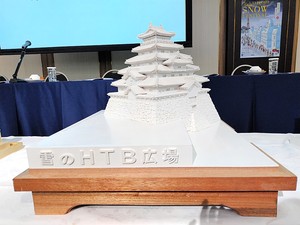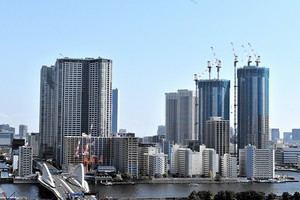REUTERS
May 23, 2024 at 13:50 JST
 Helicopters fly over with Taiwan national flag during an inauguration celebration of Taiwan's President Lai Ching-te in Taipei, Taiwan, on May 20, 2024. China's military held exercises surrounding Taiwan on Thursday, May 23, 2024, in what it called punishment for separatist forces seeking independence on the self-governed island where a new president took office this week. (AP Photo)
Helicopters fly over with Taiwan national flag during an inauguration celebration of Taiwan's President Lai Ching-te in Taipei, Taiwan, on May 20, 2024. China's military held exercises surrounding Taiwan on Thursday, May 23, 2024, in what it called punishment for separatist forces seeking independence on the self-governed island where a new president took office this week. (AP Photo)
CANBERRA/SYDNEY--Chinese military drills in the straits of Taiwan in 2023 practiced maneuvers key to an invasion of the island, although an actual attack was not imminent or inevitable, a senior U.S. general in the region said on Thursday.
In the exercises, the People’s Liberation Army simulated a maritime and air blockade of Taiwan, amphibious assaults and counter-intervention operations, Lieutenant General Stephen Sklenka, Deputy Commander of U.S. Indo-Pacific Command, said in a speech in Canberra.
“The PLA continues to exercise critical elements of a potential military invasion of Taiwan,” he said.
Hours before his remarks, Taiwan’s military mobilized its forces on Thursday after China started two days of “punishment” drills around Taiwan in what it said was a response to “separatist acts.”
The latest Chinese military drills come three days after Lai Ching-te - a man Beijing detests as a “separatist” - took office as Taiwan’s new president. China views democratically governed Taiwan as its own territory. Taiwan’s government says only Taiwan’s people can decide their future.
China’s military exercises are part of a sustained pressure campaign against Taiwan stretching back to 2022, said Sklenka, adding that once-rare incursions into Taiwan’s air defense identification zone have become normal.
Although President Xi Jinping’s order for China’s military to be prepared for invasion of Taiwan by 2027 needs to be taken seriously, an actual attack is not inevitable or imminent, he said.
“I cannot underscore enough how devastating conflict in the Indo-Pacific region would be,” Sklenka said in the speech to Australia’s National Press Club.
“At stake would be untold numbers of lives, trillions of dollars in global economic damage, and maintenance of an international order that has delivered relative peace and stability over the past 80 years,” he said. “And that is why we need to work together to prevent conflict.”
China ramped up military pressure on Taiwan in April and May in the lead-up to the inauguration of Taiwan’s new president. Fighter jets staged mock attacks on foreign vessels while ships and planes encroached close to the island.
Only weeks earlier, China clashed with the Philippines in the contested South China Sea, triggering a diplomatic row and commitments from Japan and the United States to deepen security ties with the Philippines.
Sklenka said China repeatedly used its ships to harass and coerce its neighbors in pursuit of “excessive, illegal and revisionist,” maritime claims and called it an “equal opportunity bully” to its neighbors ringing the sea.
Less than a month after Australia criticized China for an unsafe aerial confrontation over the Yellow Sea, Sklenka said the U.S. military had logged roughly 300 such intercepts since 2021.




















A peek through the music industry’s curtain at the producers who harnessed social media to help their idols go global.
A series based on diplomatic documents declassified by Japan’s Foreign Ministry
Here is a collection of first-hand accounts by “hibakusha” atomic bomb survivors.
Cooking experts, chefs and others involved in the field of food introduce their special recipes intertwined with their paths in life.
A series about Japanese-Americans and their memories of World War II